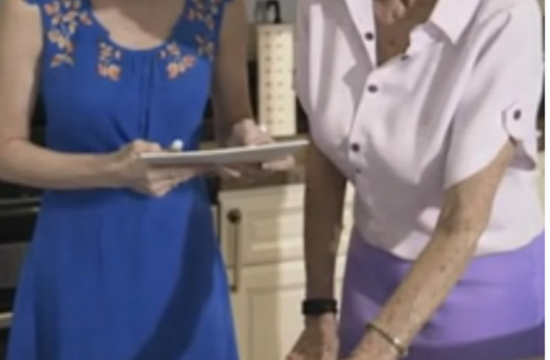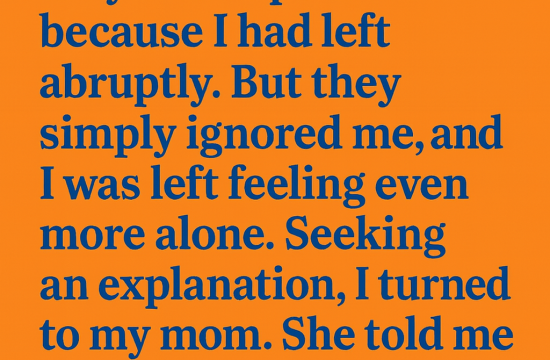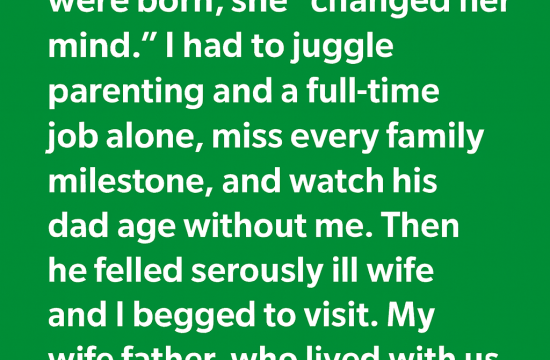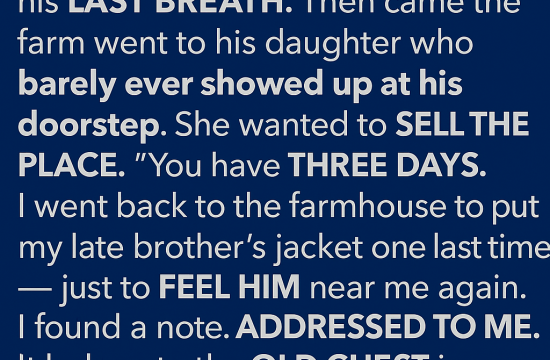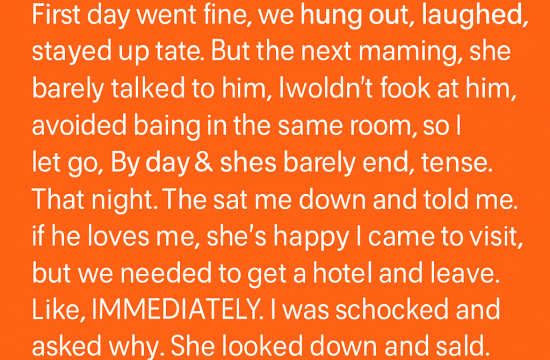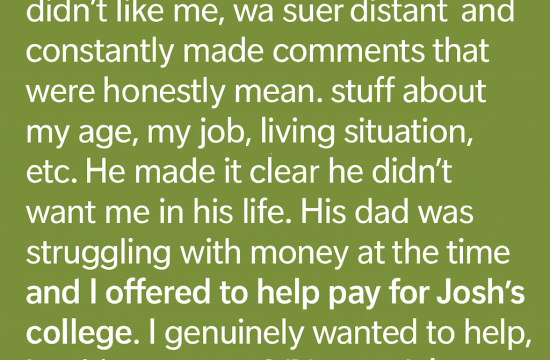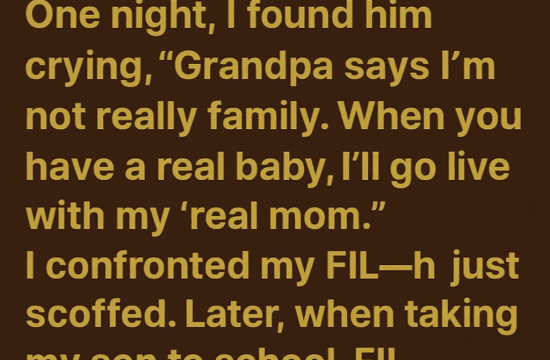When people talk about breakups, they picture yelling, tears, maybe a slammed door or a shattered vase.
Mine had none of that.
It began with a critique about lasagna.
“You never drain the beef properly, Joe,” Megan said one night, poking at her plate like the food had personally insulted her. “I thought you’d have gotten it right by now.”
I stood there, dishtowel slung over my shoulder, thinking—not for the first time—that she could have simply said thank you.
We’d been together for four years, living together for two. The house wasn’t even one we chose together. I’d inherited it from my grandmother and spent months repainting walls, swapping out old doorknobs, trying to make it feel like ours.
When Megan quit her job to “focus on the job search,” I didn’t push back. She said her old position was toxic, beneath her qualifications, and holding her back.
I believed her.
Or maybe I just wanted to believe her.
So, I paid for everything—utilities, groceries, gas, her phone, the internet. I didn’t tally or keep score. That’s what you do when you love someone: you step up when they’re struggling, you make space for them to grow.
I cooked every night. I cleaned bathrooms, vacuumed carpets, folded laundry. Some nights I came home with a splitting headache and still made dinner before she even looked up from her phone.
Megan’s mornings started with “job searching,” but by afternoon I’d hear YouTube hauls playing in the bedroom, smell fresh nail polish, and hear the telltale ding of another package being delivered.
Outfit after outfit.
“They’re professional clothes, Joe!” she’d say with a laugh.
Meanwhile, my own career—editing photos and reels—was the only thing keeping us afloat. I didn’t complain, even when the guest room overflowed with her unopened shopping bags, tags still on the clothes, as though they were promises she’d never keep.
I told myself she was just getting ready for her new chapter.
I wanted to believe that.
Then, over omelets one morning, she grinned and announced, “I’m manifesting big-girl energy, babe! My new boots arrive today. They scream lavish life.”
I laughed, because that’s what you do when you’re in love, even when your stomach knots up.
But over time, things changed.
Slowly at first… then all at once.
She became cold, critical. Passive-aggressive if towels weren’t folded her way. Irritated if I turned leftovers into something new instead of cooking fresh.
I chalked it up to stress, gave her grace. And kept giving it.
Until grace ran out.
One Thursday night, after another tense moment about the fridge, Megan sighed dramatically.
“Joe, I don’t think this is working anymore…”
I froze, still half-turned toward the open fridge.
“What’s not working, Meg?”
“This. Us. I’m not happy. You don’t take care of things the way I need you to.”
Her voice wasn’t angry—just final. Like she’d rehearsed it. Like she was reading a script.
We argued—not loudly, but enough to make it clear: this wasn’t a rough patch. It was the end.
I slept on the couch that night. My back ached in the morning. I left early for work just to escape the thick silence.
Two days later, we sat on the porch, pretending to be civil. I gently told her she needed to move out.
Her mouth twisted in amusement. “Where am I supposed to go, Joe? My mom’s in an RV. I can’t just rent a place overnight.”
“You’ve got some savings from your grandparents, right?” I asked, though I already knew the answer.
She laughed, sharp and cold.
“That money’s gone, Joe. School stuff.”
I knew better—those funds had gone to designer bags, diamond earrings, and that Dyson hair tool gathering dust in the bathroom.
But I didn’t argue. What was the point?
“Alright, Megan,” I said softly. “I’ll give you 45 days.”
“Legally, you only need to give me 30,” she blinked.
“I know. But I’ve loved you long enough to give you more.”
For a moment, it felt like we might handle this maturely.
Then things took a strange turn.
Within a week, she started “trying.” Cooking dinner, picking up my dry cleaning, laughing at my dumb jokes. She even wore the necklace I’d given her—the one she’d once called too plain.
I wanted to believe her, but something felt hollow, like she was playing a role.
Then came the moment that changed everything.
One afternoon, I passed the guest room and heard her voice through the cracked door.
“I can’t move out and pay for my own place, cook, clean… I can’t do all of that, Becca. So let this dummy believe I want our relationship back. I just need more time.”
I froze, heart pounding, listening.
She laughed.
“Joe is being so nice lately. So sweet! It’s almost cute, Becs. Like a sad little golden retriever trying to keep his family together.”
I backed away quietly, went for a walk just to breathe. When I came back, she was in the kitchen humming like nothing happened.
That night, I called her mom. I told Abigail everything: the breakup, the overheard phone call, the freeloading. My voice shook, but I stayed calm.
“She told us she was working,” Abigail whispered after a long pause. “Saving up to buy a car. She even sent me SUV pictures.”
“She’s been unemployed for over a year,” I said quietly.
Abigail was silent, then sighed. “We’ll come get her, Joe.”
Three days later, Abigail and her husband Duncan pulled into the driveway with a Subaru and a camper. Megan stood on the porch, arms crossed like armor.
“I can’t believe you called them,” she hissed as I carried her suitcase out.
“You can’t live here anymore,” I said evenly.
“This is my home too,” she snapped.
“No,” I said, setting her bag down carefully. “It’s mine. And you made it clear you didn’t want to be in this relationship.”
Her parents said nothing. They didn’t need to.
When the last bag was loaded, Megan turned to me, eyes blazing.
“I hate you,” she spat.
I sighed, too tired to feel anger.
“That’s fine, Megan. You don’t have to like me. But you can’t lie to me and live off me and expect nothing to change.”
She climbed into the car and slammed the door.
I watched as they drove away, the porch suddenly feeling bigger, lighter—like it belonged to me again.
Inside, the kitchen felt different too. No scribbled notes, no lists, no simmering resentment. Just space. Honest and quiet. For the first time in months, I felt like I could breathe.
It’s been three months since Megan left. I don’t think about her much anymore—not out of bitterness, just clarity.
Work has been great—one of my reels went semi-viral, and now a travel publication’s sending me to Botswana for a 10-day wildlife photography project.
The house feels like mine again. The fridge has food I actually eat. The closet isn’t overflowing with someone else’s chaos. Even the light feels warmer.
Some evenings I sit on the porch with a beer and my camera, catching golden-hour shots of the maple trees. There’s a hawk that lands on the same branch every week. I named him Kevin.
No, life isn’t perfect. But it’s mine.
The past doesn’t live here anymore.
And this peace?
This peace is mine to keep.




